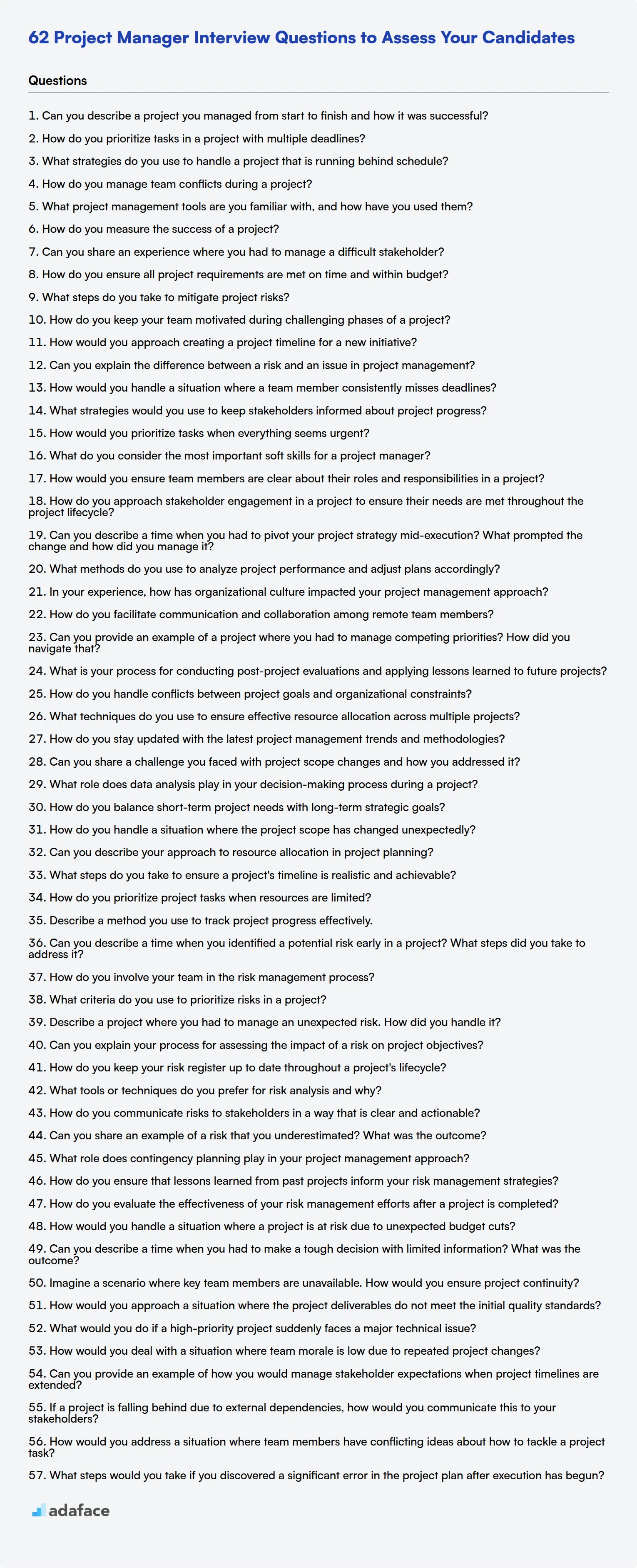Project management is a diverse field requiring a unique mix of skills to navigate complex projects and lead teams effectively. By understanding what questions to ask during interviews, hiring managers can better gauge a candidate's ability to handle the challenges of this dynamic role and pinpoint key skills, such as those highlighted in the skills required for program managers.
This blog post compiles a selection of interview questions designed for various levels of project management roles. From basic queries to advanced situational questions, you will find comprehensive coverage for assessing candidates from junior to senior positions.
Employing these targeted questions during interviews will help you identify top talent and make informed hiring decisions. For a more streamlined recruitment process, consider using a project management test before scheduling interviews.
Table of contents
10 basic Project Manager interview questions and answers to assess applicants

To effectively evaluate potential candidates for a Project Manager role, use this list of insightful questions. These questions are designed to reveal the applicants' understanding of project management fundamentals and their ability to handle real-world challenges.
- Can you describe a project you managed from start to finish and how it was successful?
- How do you prioritize tasks in a project with multiple deadlines?
- What strategies do you use to handle a project that is running behind schedule?
- How do you manage team conflicts during a project?
- What project management tools are you familiar with, and how have you used them?
- How do you measure the success of a project?
- Can you share an experience where you had to manage a difficult stakeholder?
- How do you ensure all project requirements are met on time and within budget?
- What steps do you take to mitigate project risks?
- How do you keep your team motivated during challenging phases of a project?
7 Project Manager interview questions and answers to evaluate junior Project Managers
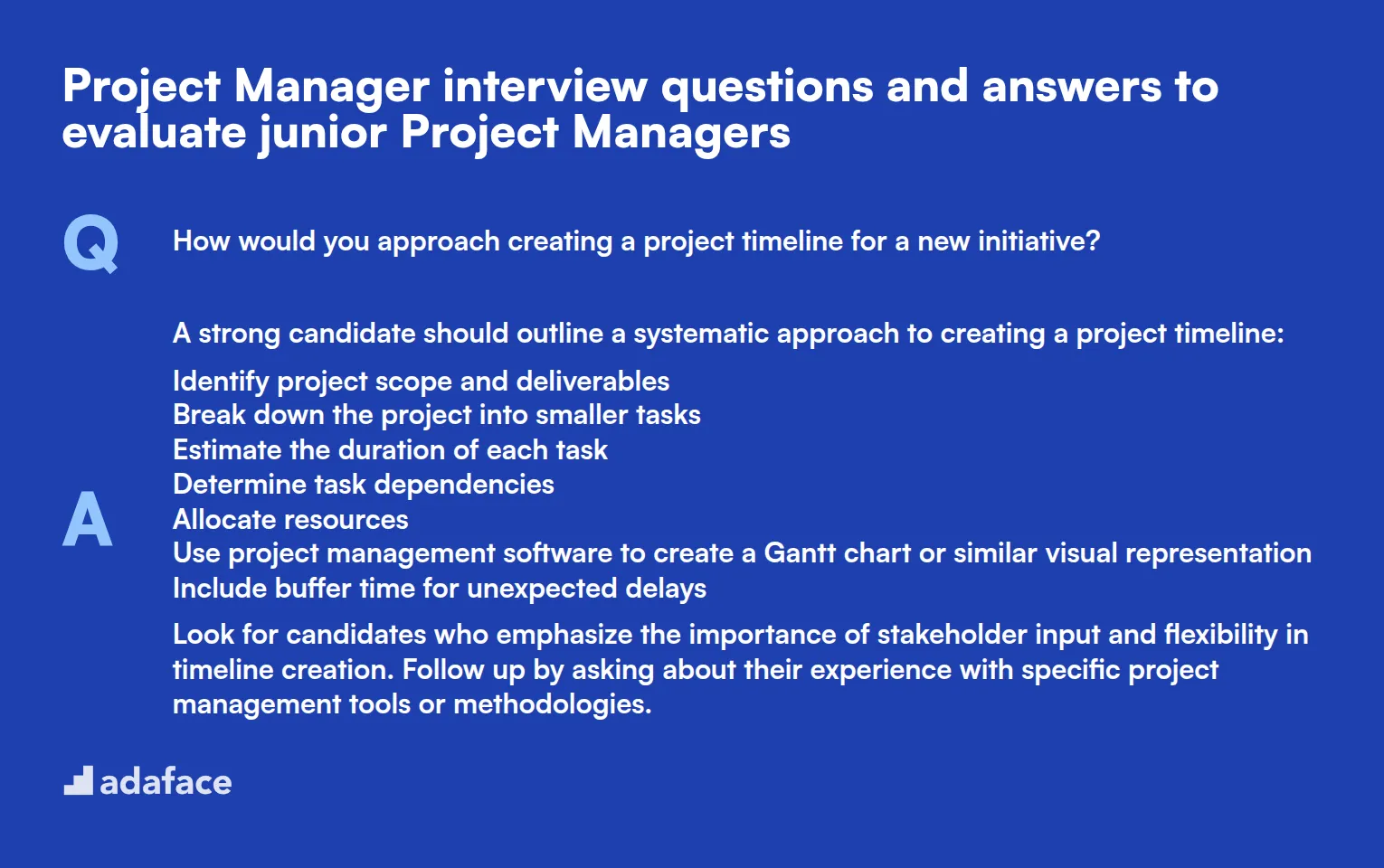
When interviewing junior Project Managers, it's crucial to assess their foundational skills and potential. These seven questions will help you evaluate their understanding of project management basics, problem-solving abilities, and communication skills. Use them as a starting point to gauge candidates' readiness for entry-level project management roles.
1. How would you approach creating a project timeline for a new initiative?
A strong candidate should outline a systematic approach to creating a project timeline:
- Identify project scope and deliverables
- Break down the project into smaller tasks
- Estimate the duration of each task
- Determine task dependencies
- Allocate resources
- Use project management software to create a Gantt chart or similar visual representation
- Include buffer time for unexpected delays
Look for candidates who emphasize the importance of stakeholder input and flexibility in timeline creation. Follow up by asking about their experience with specific project management tools or methodologies.
2. Can you explain the difference between a risk and an issue in project management?
A well-informed candidate should clearly differentiate between risks and issues:
- Risk: A potential future event that may impact the project negatively or positively. Risks are uncertainties that haven't occurred yet.
- Issue: A current problem or situation that is already affecting the project and needs immediate attention.
Listen for candidates who mention the importance of risk management strategies and issue resolution processes. A strong answer might also touch on how risks can turn into issues if not properly managed.
3. How would you handle a situation where a team member consistently misses deadlines?
A thoughtful response should include steps like:
- Schedule a private meeting with the team member to understand the root cause of the delays
- Offer support and resources if needed
- Collaboratively develop an improvement plan with clear expectations
- Monitor progress and provide regular feedback
- Escalate to HR or senior management if the issue persists
Look for candidates who emphasize open communication, problem-solving, and a balance between support and accountability. Their approach should align with good leadership skills in project management.
4. What strategies would you use to keep stakeholders informed about project progress?
An effective answer might include:
- Regular status reports or updates via email
- Scheduled check-in meetings or calls
- Use of project management software with stakeholder access
- Creation of project dashboards for real-time updates
- Tailoring communication methods to stakeholder preferences
Evaluate candidates on their understanding of the importance of transparent, consistent communication. Look for those who mention adapting their approach based on stakeholder needs and project complexity.
5. How would you prioritize tasks when everything seems urgent?
A strong candidate should describe a structured approach to prioritization, such as:
- Assess the impact of each task on project goals and deadlines
- Consult with stakeholders to understand their priorities
- Use prioritization techniques like the Eisenhower Matrix or MoSCoW method
- Consider dependencies between tasks
- Evaluate available resources and team capacity
Look for answers that demonstrate analytical thinking and the ability to make tough decisions under pressure. Candidates should also mention the importance of clear communication with the team and stakeholders about prioritization decisions.
6. What do you consider the most important soft skills for a project manager?
A well-rounded answer should include skills such as:
- Communication: Both verbal and written
- Leadership: Ability to motivate and guide a team
- Problem-solving: Finding creative solutions to challenges
- Adaptability: Flexibility in the face of change
- Emotional intelligence: Understanding and managing team dynamics
Pay attention to candidates who can provide examples of how they've applied these skills in past experiences or academic projects. Their answer should reflect an understanding of the human aspect of project management.
7. How would you ensure team members are clear about their roles and responsibilities in a project?
An effective approach might include:
- Creating detailed role descriptions and responsibility matrices
- Holding kick-off meetings to discuss and clarify roles
- Using RACI charts (Responsible, Accountable, Consulted, Informed)
- Regular check-ins to address any role ambiguities
- Encouraging open communication about task ownership
Look for candidates who emphasize the importance of clear documentation and ongoing communication. A strong answer might also mention the need to adjust roles as the project evolves and the importance of aligning roles with team members' strengths.
15 advanced Project Manager interview questions to ask senior Project Managers
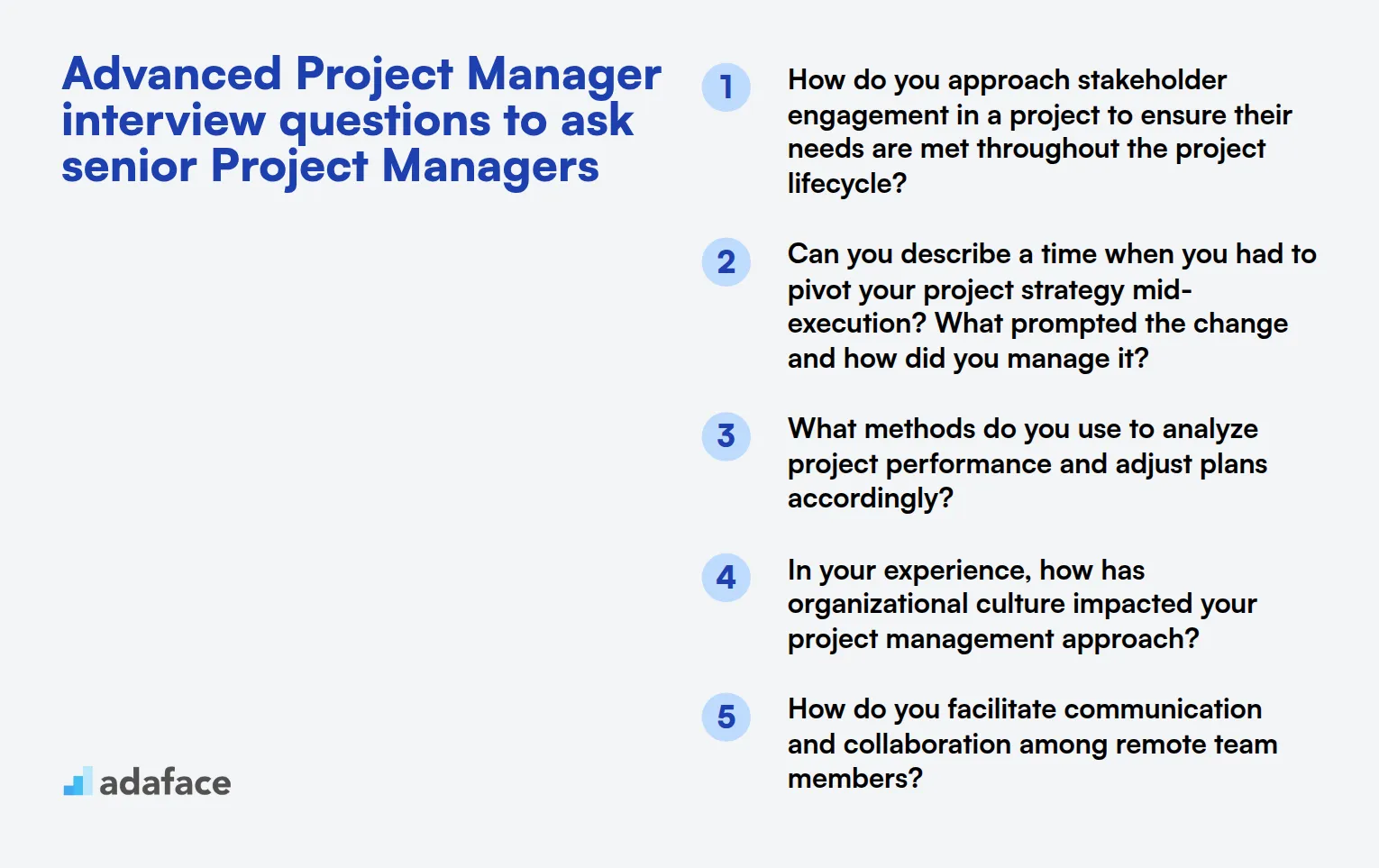
To effectively evaluate the expertise of senior project manager candidates, use this curated list of advanced questions. They will help you uncover deeper insights into their management style, decision-making processes, and adaptability. This will ensure you select someone who can handle complex projects and elevate your team's performance. For more information on project management roles, check out this job description.
- How do you approach stakeholder engagement in a project to ensure their needs are met throughout the project lifecycle?
- Can you describe a time when you had to pivot your project strategy mid-execution? What prompted the change and how did you manage it?
- What methods do you use to analyze project performance and adjust plans accordingly?
- In your experience, how has organizational culture impacted your project management approach?
- How do you facilitate communication and collaboration among remote team members?
- Can you provide an example of a project where you had to manage competing priorities? How did you navigate that?
- What is your process for conducting post-project evaluations and applying lessons learned to future projects?
- How do you handle conflicts between project goals and organizational constraints?
- What techniques do you use to ensure effective resource allocation across multiple projects?
- How do you stay updated with the latest project management trends and methodologies?
- Can you share a challenge you faced with project scope changes and how you addressed it?
- What role does data analysis play in your decision-making process during a project?
- How do you balance short-term project needs with long-term strategic goals?
8 Project Manager interview questions and answers related to project planning
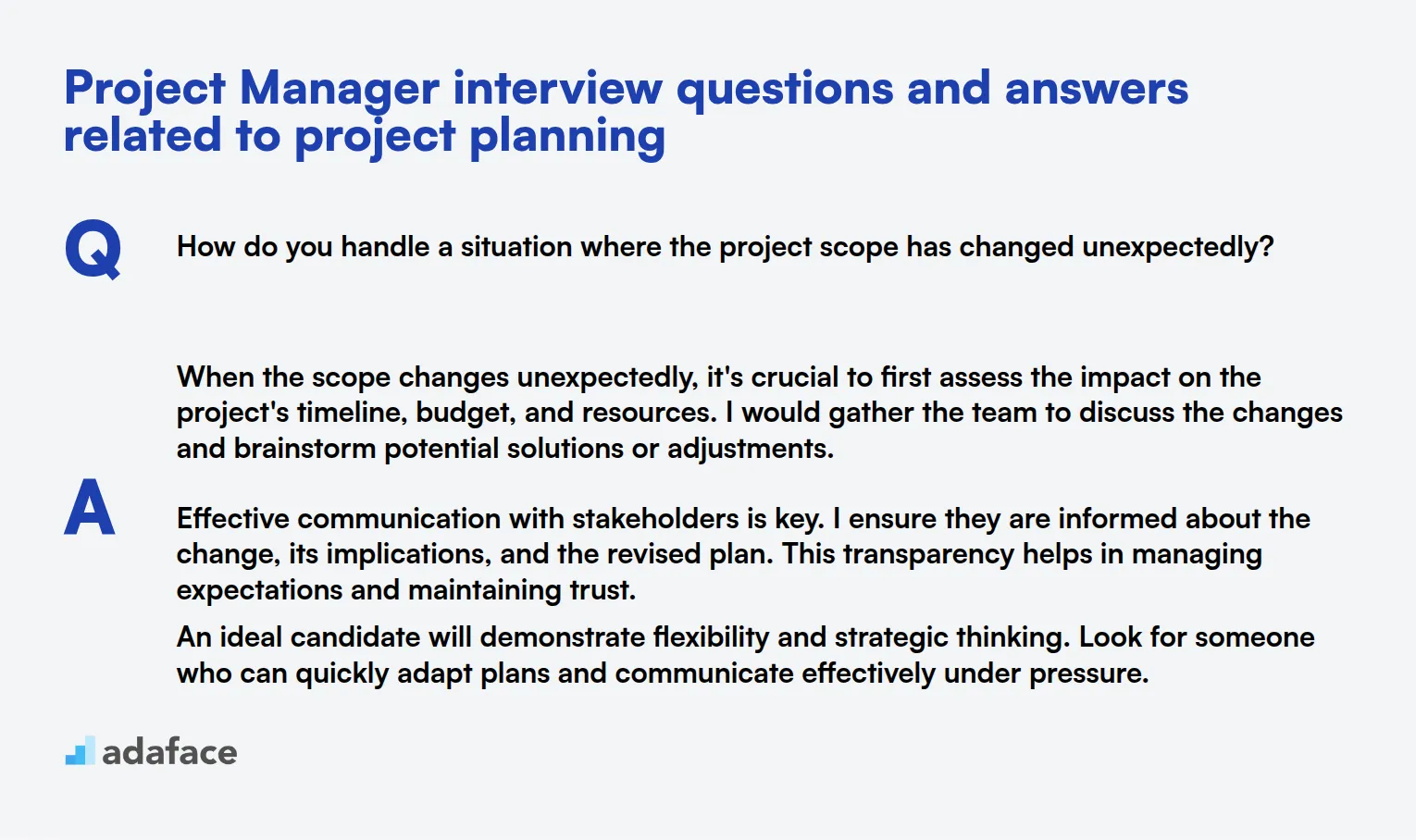
Ready to find the planning prodigy who can turn your project dreams into reality? Dive into these targeted project planning interview questions, designed to unveil not just the skills, but the strategies and foresight required for effective project management.
1. How do you handle a situation where the project scope has changed unexpectedly?
When the scope changes unexpectedly, it's crucial to first assess the impact on the project's timeline, budget, and resources. I would gather the team to discuss the changes and brainstorm potential solutions or adjustments.
Effective communication with stakeholders is key. I ensure they are informed about the change, its implications, and the revised plan. This transparency helps in managing expectations and maintaining trust.
An ideal candidate will demonstrate flexibility and strategic thinking. Look for someone who can quickly adapt plans and communicate effectively under pressure.
2. Can you describe your approach to resource allocation in project planning?
I start by clearly defining project goals and requirements, then assess the team's capabilities and availability. Prioritizing tasks based on importance and urgency helps in optimal resource distribution.
I also factor in potential risks and constraints to ensure resources are allocated efficiently. Regular check-ins and adjustments are made to align with the project's progress and any changes in scope or priorities.
A strong candidate will show an understanding of balancing resources while minimizing waste. They should be able to explain their method for aligning resources with project objectives.
3. What steps do you take to ensure a project's timeline is realistic and achievable?
I begin by breaking down the project into smaller tasks and estimating the time required for each, consulting with team members for their input. This collaborative approach results in more accurate estimates.
I then build in buffer time for unforeseen delays and regularly review the timeline as the project progresses. Adjustments are made as needed to stay on track while maintaining quality.
Look for candidates who emphasize communication and flexibility. They should be able to articulate their process for validating and adjusting timelines as necessary.
4. How do you prioritize project tasks when resources are limited?
In situations with limited resources, I focus on identifying tasks that are critical to the project's success. I prioritize these tasks based on their impact and dependency on other tasks.
I also engage the team in discussions to understand their perspectives and gather insights, which helps in making informed decisions on task prioritization.
An ideal candidate will demonstrate a methodical approach to prioritizing tasks, ensuring that limited resources are directed towards the most impactful areas of the project.
5. Describe a method you use to track project progress effectively.
I use a combination of project management tools and regular check-ins to track progress. Tools like Gantt charts or Kanban boards provide a visual representation of the project's status.
Regular team meetings keep everyone aligned and allow for quick identification and resolution of any issues. I also ensure that progress reports are shared with stakeholders to maintain transparency.
Candidates should display familiarity with various tracking methods and demonstrate their ability to leverage these tools for maintaining project momentum.
12 Project Manager questions related to risk management
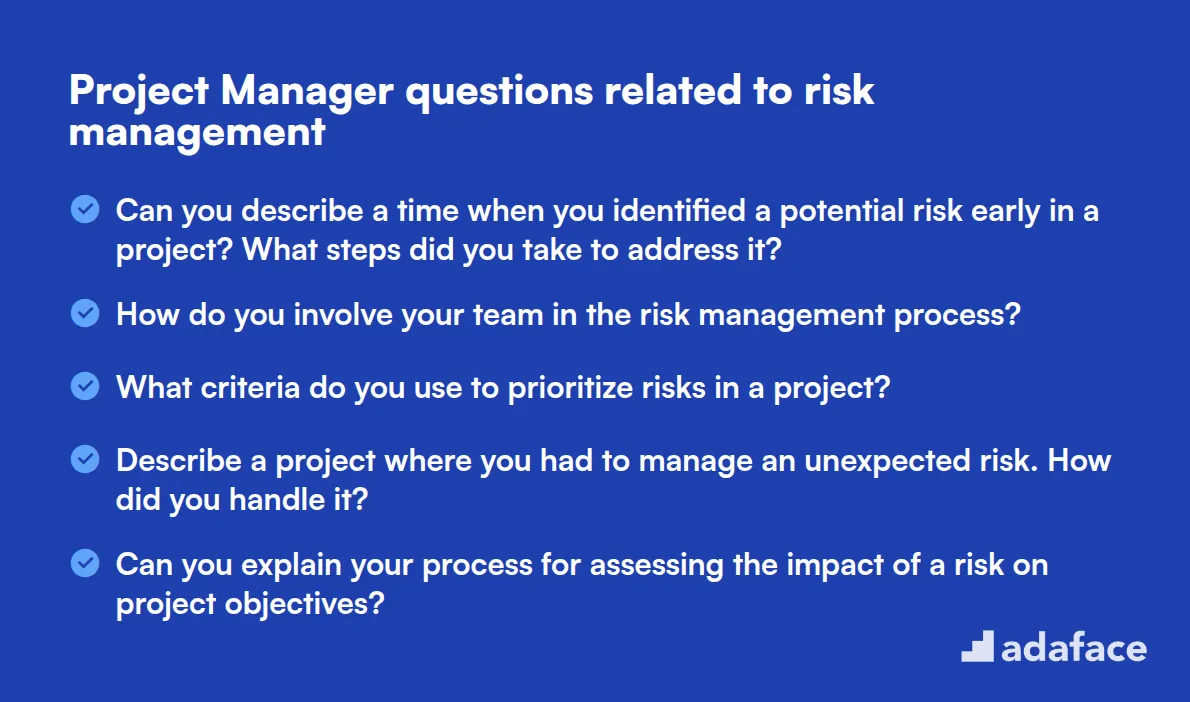
To evaluate a candidate’s ability to foresee and handle uncertainties, use these risk management questions. They will help you gauge how well applicants can anticipate challenges and devise strategies to mitigate them. This is crucial for ensuring project success in any project manager job description.
- Can you describe a time when you identified a potential risk early in a project? What steps did you take to address it?
- How do you involve your team in the risk management process?
- What criteria do you use to prioritize risks in a project?
- Describe a project where you had to manage an unexpected risk. How did you handle it?
- Can you explain your process for assessing the impact of a risk on project objectives?
- How do you keep your risk register up to date throughout a project's lifecycle?
- What tools or techniques do you prefer for risk analysis and why?
- How do you communicate risks to stakeholders in a way that is clear and actionable?
- Can you share an example of a risk that you underestimated? What was the outcome?
- What role does contingency planning play in your project management approach?
- How do you ensure that lessons learned from past projects inform your risk management strategies?
- How do you evaluate the effectiveness of your risk management efforts after a project is completed?
10 situational Project Manager interview questions for hiring top Project Managers
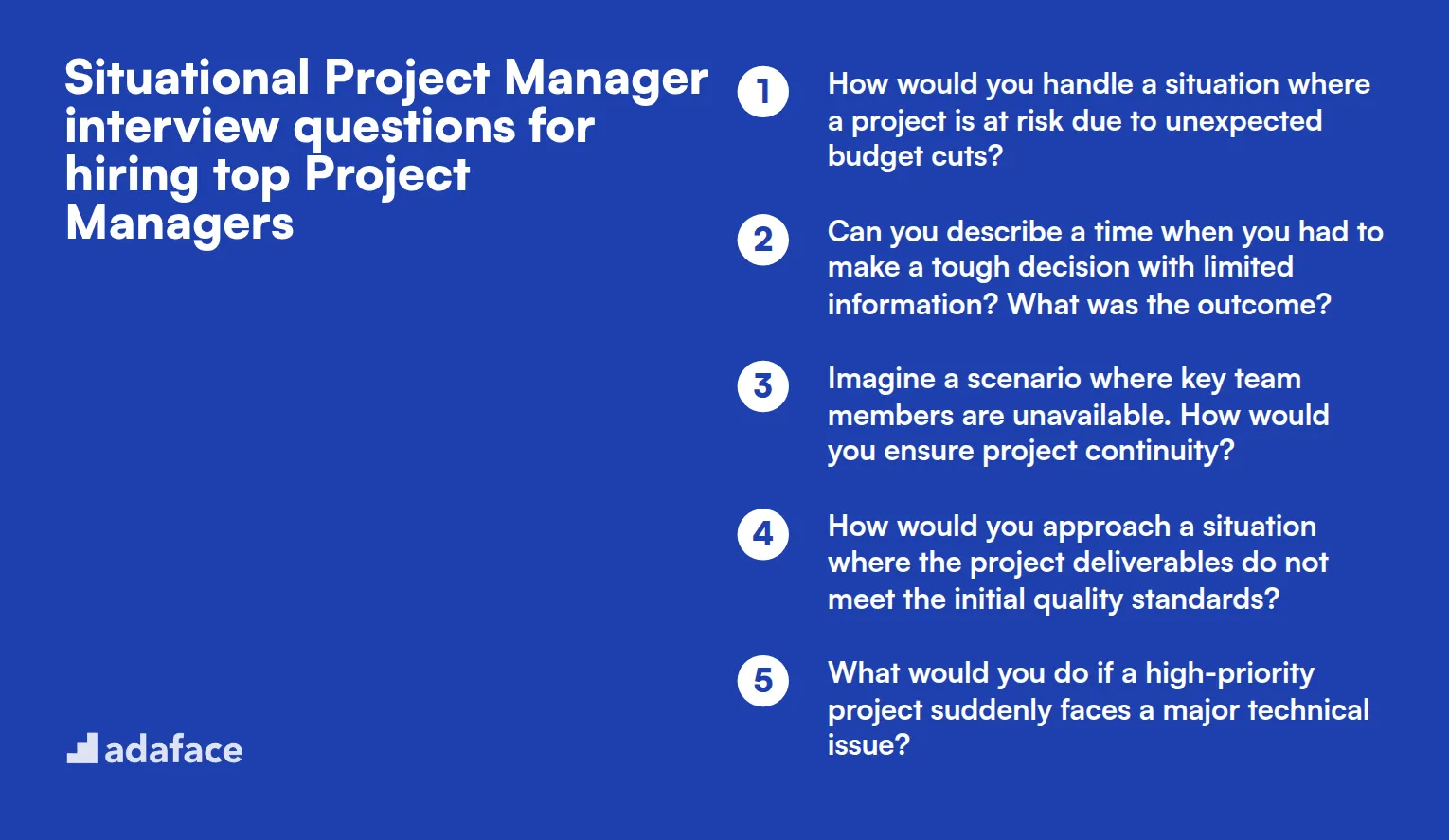
To identify whether candidates possess the critical thinking and problem-solving skills essential for effective project management, utilize this list of situational questions. These queries will help you assess how applicants would navigate real-world challenges they might face in a role like a Project Manager.
- How would you handle a situation where a project is at risk due to unexpected budget cuts?
- Can you describe a time when you had to make a tough decision with limited information? What was the outcome?
- Imagine a scenario where key team members are unavailable. How would you ensure project continuity?
- How would you approach a situation where the project deliverables do not meet the initial quality standards?
- What would you do if a high-priority project suddenly faces a major technical issue?
- How would you deal with a situation where team morale is low due to repeated project changes?
- Can you provide an example of how you would manage stakeholder expectations when project timelines are extended?
- If a project is falling behind due to external dependencies, how would you communicate this to your stakeholders?
- How would you address a situation where team members have conflicting ideas about how to tackle a project task?
- What steps would you take if you discovered a significant error in the project plan after execution has begun?
Which Project Manager skills should you evaluate during the interview phase?
While it's impossible to assess every aspect of a candidate during a single interview, focusing on core Project Manager skills is crucial. These key competencies form the foundation for successful project leadership and execution.
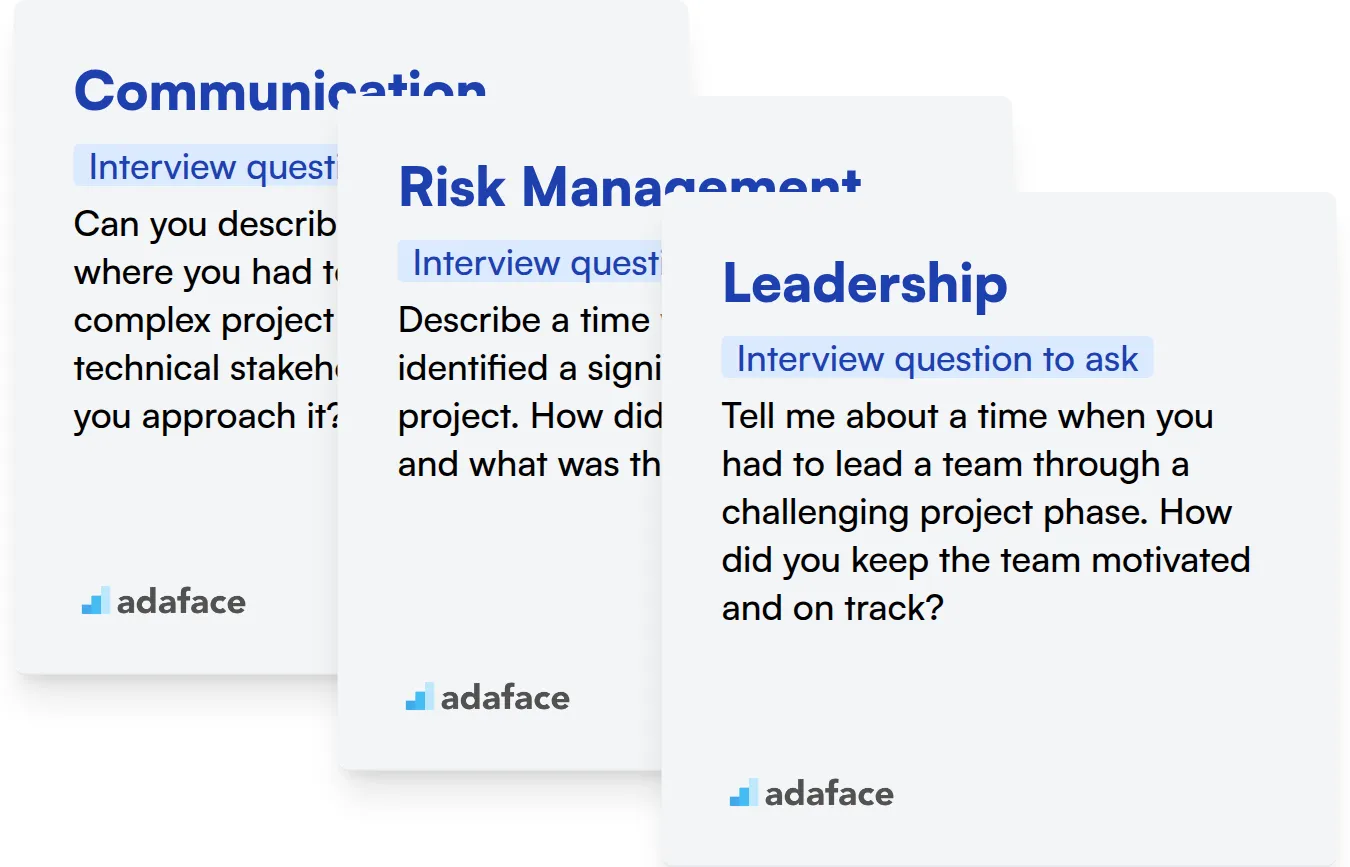
Communication
Effective communication is at the heart of project management. Project Managers must articulate goals, delegate tasks, and keep stakeholders informed throughout the project lifecycle.
To evaluate communication skills, consider using an assessment test with relevant multiple-choice questions. This can help filter candidates based on their communication abilities.
During the interview, you can ask targeted questions to gauge the candidate's communication skills. Here's an example:
Can you describe a situation where you had to communicate a complex project idea to non-technical stakeholders? How did you approach it?
Look for candidates who can explain their approach clearly, mentioning techniques like using analogies, visual aids, or breaking down complex ideas into simpler terms. Their answer should demonstrate adaptability in communication style.
Risk Management
Project Managers need to anticipate, identify, and mitigate risks that could impact project success. This skill is vital for keeping projects on track and within budget.
Consider using a project management test that includes questions on risk management to assess candidates' knowledge in this area.
To evaluate risk management skills during the interview, you might ask:
Describe a time when you identified a significant risk in a project. How did you handle it, and what was the outcome?
Listen for candidates who can articulate a clear process for risk identification, assessment, and mitigation. They should be able to explain the impact of their actions on the project's outcome.
Leadership
Leadership skills are essential for guiding teams, making decisions, and ensuring project success. Project Managers must inspire and motivate team members to achieve project goals.
An assessment test focusing on situational judgment can help evaluate leadership potential in candidates.
To assess leadership skills in the interview, consider asking:
Tell me about a time when you had to lead a team through a challenging project phase. How did you keep the team motivated and on track?
Look for responses that demonstrate the candidate's ability to inspire, provide clear direction, and support team members. Effective leaders should be able to share specific strategies they used to overcome challenges and maintain team morale.
3 Tips for Successfully Using Project Manager Interview Questions
Before you dive into conducting interviews, here's some last-minute advice from us to make the most out of your Project Manager interview questions.
1. Integrate Skills Tests into Your Interview Process
Incorporating skills tests before interviews ensures that you evaluate candidates based on their actual project management capabilities. This practice provides a clear picture of each candidate's skills before they come for an interview.
Consider using role-specific assessments relevant to project management, such as the Project Management Test or the Scrum Master Test. These tests can help filter candidates who meet the basic skill requirements.
By assessing candidates' practical skills through these tests, you can save time and focus your interviews on exploring deeper insights. This approach ensures you're interviewing candidates who are genuinely qualified for the role.
2. Select and Organize Interview Questions Wisely
In an interview setting, time is limited, so it's important to choose the most relevant questions that provide insights into candidates' abilities. This focused approach ensures you cover essential aspects related to the job.
Compile a tailored set of questions that reflect the specific needs of your organization or the current role. To supplement your list, consider questions from related fields like communication or questions from roles like product managers.
Leveraging questions from various domains allows you to evaluate candidates on all necessary fronts, ensuring a comprehensive assessment of their skills and capabilities.
3. Don’t Forget to Ask Follow-Up Questions
Standard interview questions often don't reveal the full picture of a candidate's abilities. Follow-up questions are vital to uncover more details and ensure candidates aren't exaggerating their experience.
For instance, if you ask, 'Can you describe a challenging project you managed and how you handled it?', a good follow-up might be, 'What specific project management techniques did you apply, and what was the outcome?' This helps you assess their practical experience and strategic thinking.
Use Project Management Tests to Enhance Your Hiring Process
When hiring a project manager, ensuring that candidates possess the right project management skills is key. One of the best ways to verify these skills is through targeted assessments. Consider using our Project Management Test or Scrum Master Test to get an accurate read on each candidate's abilities.
Once you've utilized these assessments, you'll be able to shortlist the most qualified candidates for interviews. To proceed, you can explore our online assessment platform or sign up to get started with your hiring process.
Project Management Test
Download Project Manager interview questions template in multiple formats
Project Manager Interview Questions FAQs
A Project Manager should have strong leadership, communication, and organizational skills, along with the ability to manage risks and solve problems effectively.
You can evaluate a candidate's project planning skills by asking them specific questions about their past experiences in planning, resource allocation, and timeline management.
Situational questions involve asking candidates how they would handle specific scenarios, such as handling project delays or managing team conflicts.
Evaluate a junior Project Manager by assessing their understanding of project management basics, their ability to work under supervision, and their eagerness to learn and grow.
Risk management is crucial because it helps identify, assess, and mitigate potential risks that could adversely affect the project's success.
A senior Project Manager typically handles larger, more complex projects, provides strategic guidance, and has a greater responsibility for decision-making and risk management.

40 min skill tests.
No trick questions.
Accurate shortlisting.
We make it easy for you to find the best candidates in your pipeline with a 40 min skills test.
Try for freeRelated posts
Free resources




